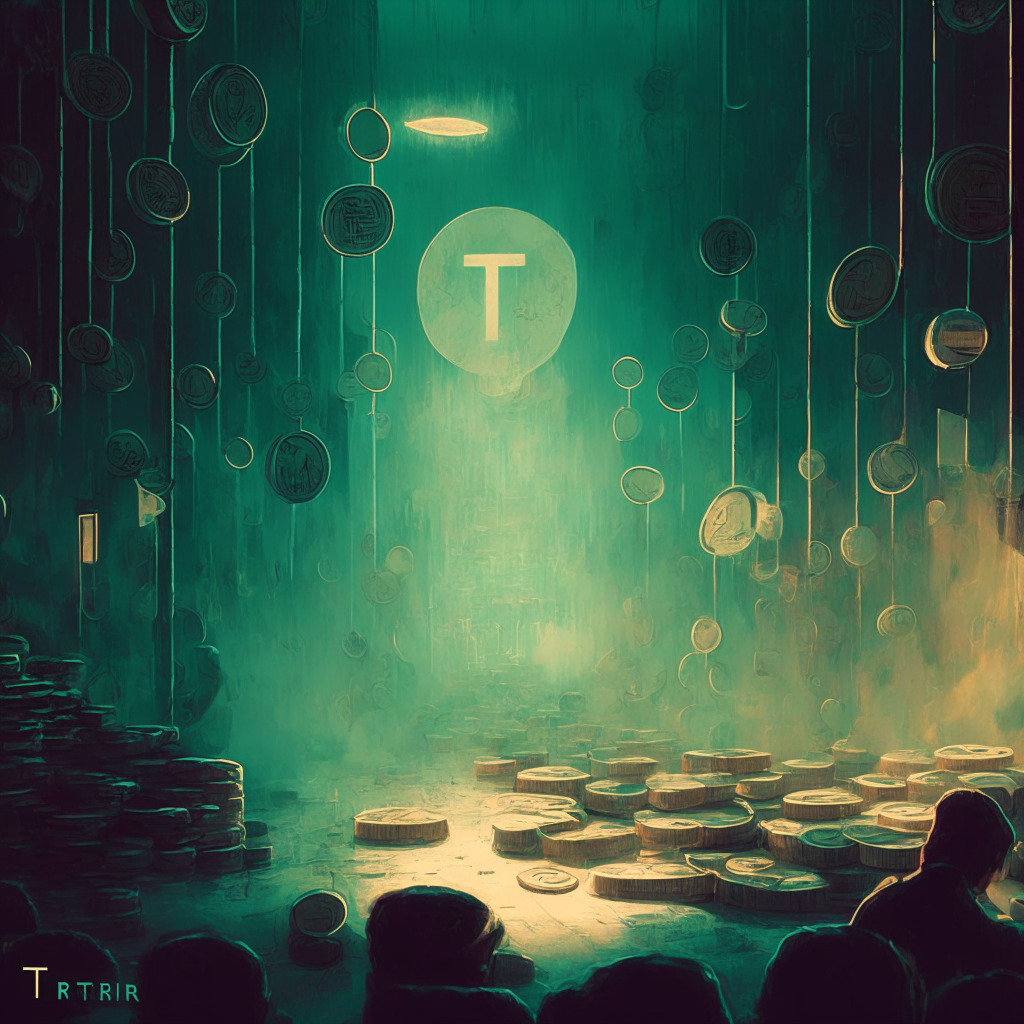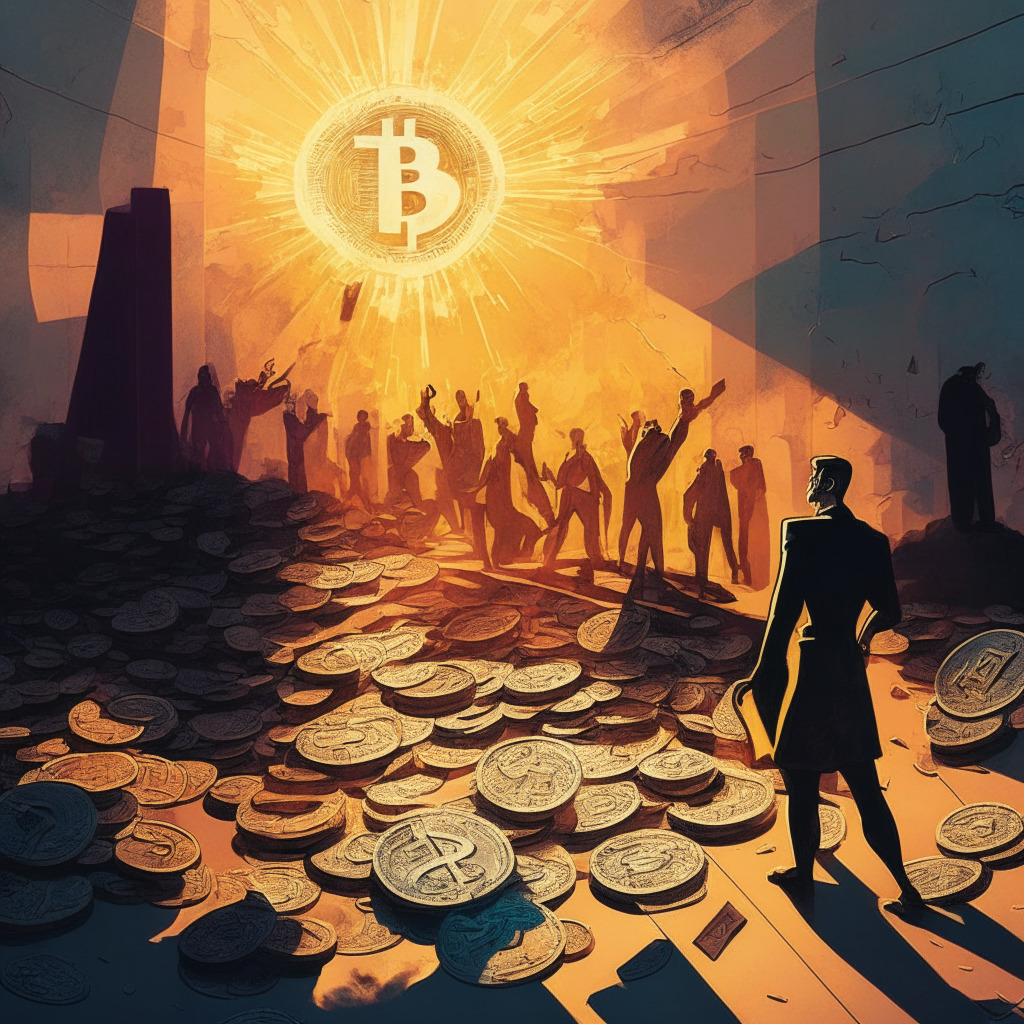Centralized stablecoins, stabilizing their price against another asset like the U.S dollar, account for 75% of all transactions on centralized crypto exchanges, with TrueUSD (TUSD) and Tether’s USDT taking significant shares. However, amid growth, controversies and transparency issues pose challenges and risks, demonstrating the crypto market’s vulnerability. The future of such stablecoins depends on addressing these vulnerabilities and embracing transparency.
Search Results for: Silicon
Demise of the Dollar: Kiyosaki’s Forecast and the Golden Opportunity for Crypto
Esteemed financial author Robert Kiyosaki forecasts the “demise” of the U.S. dollar following the alliance of BRICS nations to establish a gold-backed currency, predicting a significant Bitcoin surge to $120,000 per coin. Economic shifts and increasing crypto interest indicate a potential upheaval of the dollar’s long-held position as world reserve currency.
Navigating the MiCA Legislation: Impacts on Private Stablecoins and the Future of Crypto Regulation
The European Union enacted the Markets in Crypto-Assets (MiCA) legislation, sparking controversy with a daily 200 million euros transaction cap for private stablecoins. This is meant to protect investors from large-scale stablecoin failures which could impact traditional financial systems. However, critics argue it could stifle innovation within the crypto landscape.
Navigating Crypto Market Stability Amidst Macro-Economic Factors and Unexpected Turns
“Macro-economic factors significantly impact the crypto industry’s future, with potential effects on inflation and interest rates. Despite challenges, Bitcoin has rallied back, trading 9.1% higher than its Anchored Volume Weighted Average Price (AVWAP). Macroeconomic developments and widespread banking collapses could potentially impact these gains, while high credit balances and potential recessions bring additional uncertainty.”
Navigating the Rocky Road to CBDC Adoption: Overcoming Obstacles and Addressing Pitfalls
Crypto researcher Fadi Aboualfa casts doubt on the efficiency of Central Bank Digital Currency (CBDC) platforms as substitutes for cash, noting their failure to address vital technical parameters. He highlights interoperability issues and warns of potential consumer trust crises in the event of a bank scandal affecting branded CBDCs.
Hut 8’s Shift from Bitcoin Mining to AI: The Future of Tech or a Temporary Lifeline?
“Hut 8, a previously struggling Bitcoin mining company, plans an ambitious revival by setting up in the United States and incorporating high-performance computing and AI. This move, spurred by industry rebound and Bitcoin mining profitability surge, illustrates a growing trend of integrating cryptocurrency with cutting-edge technology.”
Navigating the Abyss: Banking Crises, Counterparty Risks and the Rise of Crypto Solutions
“Sombre banking crises globally reveal the fragility of traditional banking systems. Crypto presents an exciting possibility – self-custody. This enables investors to control risk factors, gain insight into asset compositions and oversight over counter-party involvement in the asset cycle, hence highlighting the dire need for alternative financial systems.”
Navigating Crypto Regulations: Lessons from Hong Kong and the US’s Missed Opportunities
“Web3 companies are shying away from New York due to stringent crypto regulations. In contrast, China and Hong Kong are embracing innovation in the crypto space, showing flexibility and support for sector growth, posing attractive alternatives for crypto enterprises.”
Circle’s Ties to Collapsed SVB: Stablecoins’ Resilience and Lessons in Risk Management
The now-collapsed Silicon Valley Bank (SVB) reportedly had Circle as its single largest asset-weighted customer, holding $3.3 billion at the time of collapse. The incident raises questions about stablecoins like Circle’s USDC and underlines the importance of due diligence and contingency planning in the crypto industry.
Collapse of Crypto-Friendly Banks: Time to Rethink Deposit Insurance Limits?
Circle and Sequoia Capital were among top depositors in collapsed Silicon Valley Bank (SVB), raising concerns about depositor fund security and current regulations in the crypto space. The situation highlights the potential need for increased deposit insurance limits as more financial institutions embrace cryptocurrencies and blockchain technology.
Bitcoin’s Correlation with Gold and Tech Stocks: How It Impacts Investment Decisions
Traders often discuss Bitcoin’s correlation with gold and tech stocks, impacting investment decisions. Although the 90-day correlation coefficient shows a positive correlation with gold and a negative one with tech stocks, long-term market positions can’t rely solely on transient correlations. Investors should interpret markets cautiously, accounting for potential risks and fluctuating correlations.
Collapsed BitGo-Prime Trust Deal: A Red Flag for Crypto Banking Stability?
The collapse of the acquisition between BitGo and Prime Trust highlights inherent risks and instability in the crypto banking industry. With setbacks generating significant concern about the stability and regulatory standing of crypto banks, investors and participants must remain vigilant and cautious when dealing with related ventures.
US Lawmakers Target Banking Failures: Impact on Crypto and Blockchain Industries
In response to major banks’ failures, US lawmakers from the House Financial Services Committee have introduced a series of bills, although not specifically mentioning crypto or blockchain. The future of regulations surrounding banks and their potential impact on the cryptocurrency and blockchain industries remain uncertain, with past lawmakers expressing optimism on stablecoin bills.
AI Safety Legislation: Balancing Innovation and Public Trust in the Era of Artificial Intelligence
US Senate Majority Leader Chuck Schumer plans to call for comprehensive legislation regarding AI safety measures, emphasizing bipartisan action from Congress. Addressing safe innovation, privacy, biases, and misinformation, Schumer aims to ensure responsible and secure AI development while maintaining public trust in the technology.
Amy Wu’s Leap from FTX Ventures to Menlo: A Fresh Start in Blockchain and AI
Amy Wu, former head of FTX Ventures, joins Menlo Ventures as a partner, focusing on consumer and gaming industries. Wu’s expertise in AI, gaming, and consumer tech positions her to expand Menlo’s influence in various consumer tech sectors. Despite challenges in Crypto, Wu’s experience could provide stimulus for the industry.
Cryptocurrency Enters US Presidential Race: Will It Define Campaign Platforms?
The upcoming US presidential elections feature candidates recognizing cryptocurrency potential in their platforms. Miami’s pro-bitcoin mayor Francis Suarez and Democratic candidate Robert F. Kennedy Jr. discuss embracing digital assets, while Republican candidate Sen. Tim Scott aims to develop a framework for them. This shift highlights digital currencies’ growing prominence in political strategy and future campaigns.
De-peg Scare in Crypto: Analyzing Stablecoin Volatility and Building Resilience
On June 15, USDT stablecoin’s price deviated from its dollar peg value by 0.3% due to an imbalance in Curve’s 3pool, causing concerns among the crypto community. A whale address borrowed 31.5 million USDT and swapped it for USDC, affecting USDT’s dollar-peg value. Tether’s CTO reassured that it’s a temporary issue, reflecting the emerging market’s volatility and growing demand for digital currencies.
Is Tether’s USDT Stablecoin Under Pressure? Examining Unusual Selling Activity
Speculation mounts that Tether’s USDT stablecoin may be under pressure, with liquidity pools on Uniswap and Curve protocols flooded with USDT sellers. A potential USDT depeg could be catastrophic for the crypto economy, raising concerns over its liquidity and stability amidst growing market share.
The Apple App Store vs Damus: Bitcoin Tipping Clash Affects Decentralized Social Media Future
Apple warns decentralized social media app, Damus, for violating its policy by enabling Bitcoin tipping via “Zaps” feature. The Damus team questions this stance, asking for clarification on whether they’re in true violation, while also pointing out potential inconsistencies in Apple’s approach.
Deepfakes, AI and Information Integrity: UN Report Raises Alarm on Misuse and its Impact
The UN report raises concerns about AI-generated deepfakes spreading hate and misinformation on social media, highlighting the importance of responsible AI use. It emphasizes the need to ensure information integrity, urging stakeholders to implement secure, ethical, and human rights-compliant measures for AI applications.
Bitcoin’s Future Amidst Global Currency Shakeup & Market Turmoil: Support Levels & Predictions
This Bitcoin price prediction article delves into market trends and technical indicators to identify potential support levels for Bitcoin amidst massive selling volume in the crypto markets. With the US dollar predicted to decline as the dominant global currency, Bitcoin’s future price movements are analyzed in relation to Chinese yuan’s potential rise and global financial dynamics.
Custodia Bank Case: The Game Changer for Crypto Regulation and Industry Growth?
The Custodia Bank case could introduce new regulatory standards for banks working with digital assets, potentially impacting the wider cryptocurrency industry. The outcome may affect the sector’s stability, growth, and the balance between regulation and innovation.
Stablecoins in a Shifting Regulatory Landscape: USDC’s Potential Advantage Over Rivals
Amidst the recent U.S. regional banking crisis, Circle, the company behind stablecoin USDC, anticipates a more optimistic future. As U.S. lawmakers draft proposals for clear crypto market regulations, Circle’s CEO believes compliance will give USDC a competitive edge over rivals.
Bankrupt FTX’s Anthropic Stake Sale: Navigating the Future of AI and Crypto Exchange Loss Recovery
The now-defunct cryptocurrency exchange FTX is looking to offload its stake in AI startup Anthropic, following bankruptcy. Anthropic, valued at $4.6 billion, is developing a general-purpose AI chatbot called Claude. The potential sale’s outcome may impact former FTX customers and stakeholders.
Bitcoin Halving 2024: Retail Demand Soars, Institutional Interest Wanes – Who Will Win?
JPMorgan’s recent report suggests strong retail demand for bitcoin will likely continue, driven by anticipation of the April 2024 halving event. Meanwhile, institutional demand appears to be waning due to factors such as fraud, increased volatility, and regulatory crackdowns. This divergence raises questions about bitcoin’s long-term value trajectory.
Creating the Ultimate Crypto-Friendly Bank: Overcoming Challenges and Seizing Opportunities
Santiago R. Santos recently proposed building a new “crypto-friendly bank” to fill the void left by the collapses of major crypto-friendly banks. Despite challenges, Santos envisions assembling a team, guided by his experience from the crypto and traditional finance worlds, to create a bank servicing individuals, businesses, and institutions in the ever-growing crypto industry.
Risky Payment Apps vs Secure Bitcoin: Navigating FDIC Protection & Financial Security
The Consumer Financial Protection Bureau (CFPB) warns that funds stored in popular payment apps may not be insured, highlighting possible financial uncertainties. Bitcoin, with its decentralized nature and self-sovereignty, gains attention as a secure alternative providing users sole ownership and control over their funds, unlike payment apps.
Ethereum Rivals Visa, Tether Hits Highs, and Global Crypto Trends: A Weekly Roundup
This week, Ethereum’s transaction volume rivaled Visa, Tether’s market cap hit a record high, and an Ethereum ICO wallet resurfaced with $15 million. Binance dominated headlines with trading discounts and privacy coin delisting news, while CBDC discussions, crypto regulations, and global partnerships shaped the future of the industry.
Genesis Bankruptcy Battle: FTX’s $3.9B Claim vs. Expedited Settlement – The High-Stakes Faceoff
FTX objects to extending court-mediated settlement talks for bankrupt crypto lender Genesis and opposes estimating their debtors’ claims at $0.00. As Genesis’ largest creditor with $3.9 billion claims, FTX’s objection adds to mounting pressure from individual creditors seeking faster resolution. Meanwhile, Genesis faces lawsuits and SEC actions over its customer lending program, Earn.
Stablecoins: A Solution to Crypto’s Banking Crisis Amid Operation Chokepoint 2.0
Stablecoins may counter the impact of Operation Chokepoint on the crypto sector, providing a solution to the US banking crisis facing crypto companies. Leveraging stablecoins can minimize bank dependency and establish an autonomous parallel financial system, despite potential risks and regulatory challenges.
P2P Payment Apps: Uncovering Hidden Risks and the Importance of FDIC Coverage
The US Consumer Financial Protection Bureau warns that funds stored in nonbank payment platforms, including those offering crypto services, may not be protected by federal deposit insurance coverage. With recent collapses involving major banks, consumers must exercise caution and understand potential risks when managing assets through online payment services.
Tether’s USDT Reclaims All-Time High Market Cap Amid Stablecoin Controversy and Competition
Tether’s stablecoin USDT has regained its all-time high market cap of $83.2 billion, despite challenges in the stablecoin market and criticism over its reserve transparency. USDT’s perceived safety from U.S. regulators and its growing use for global payments contribute to this resurgence, highlighting peg stability as a priority for users.































